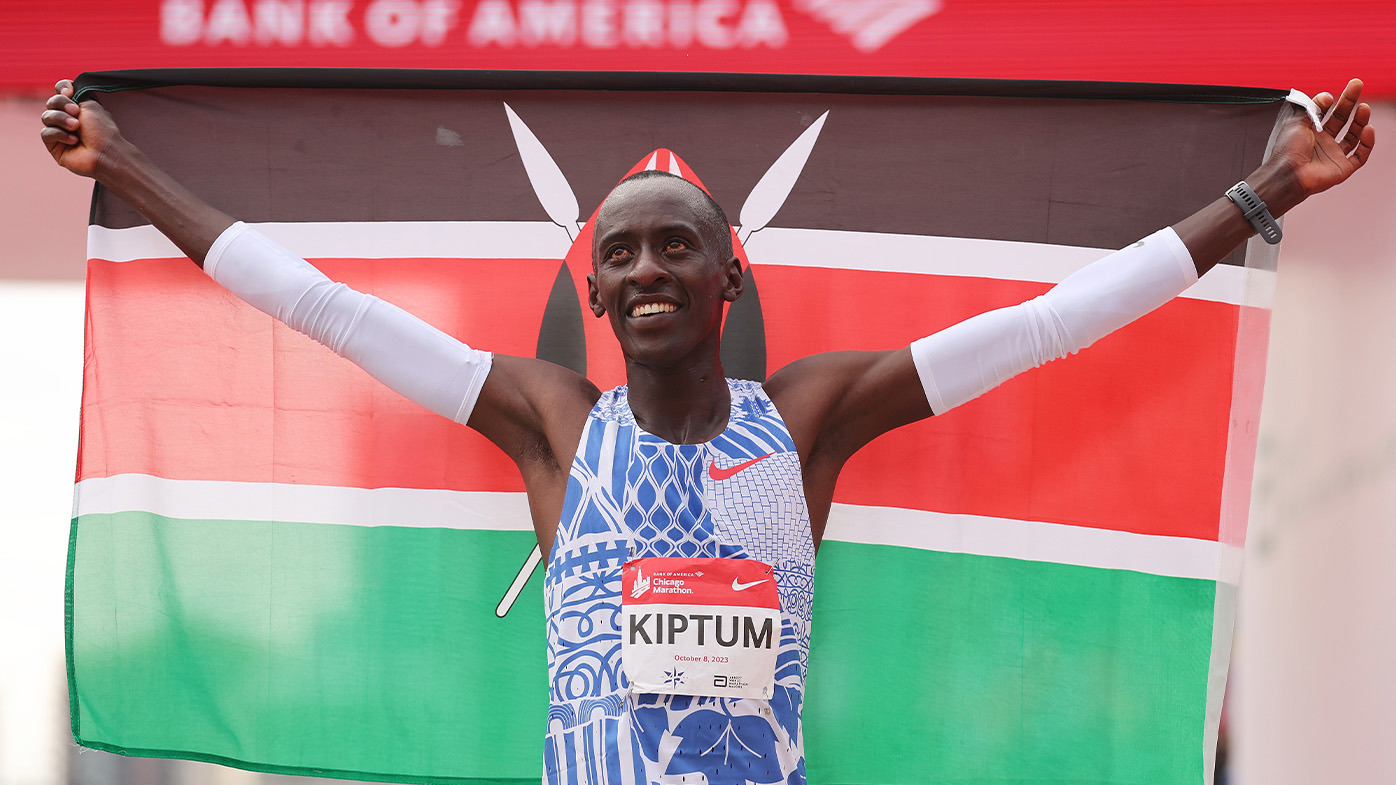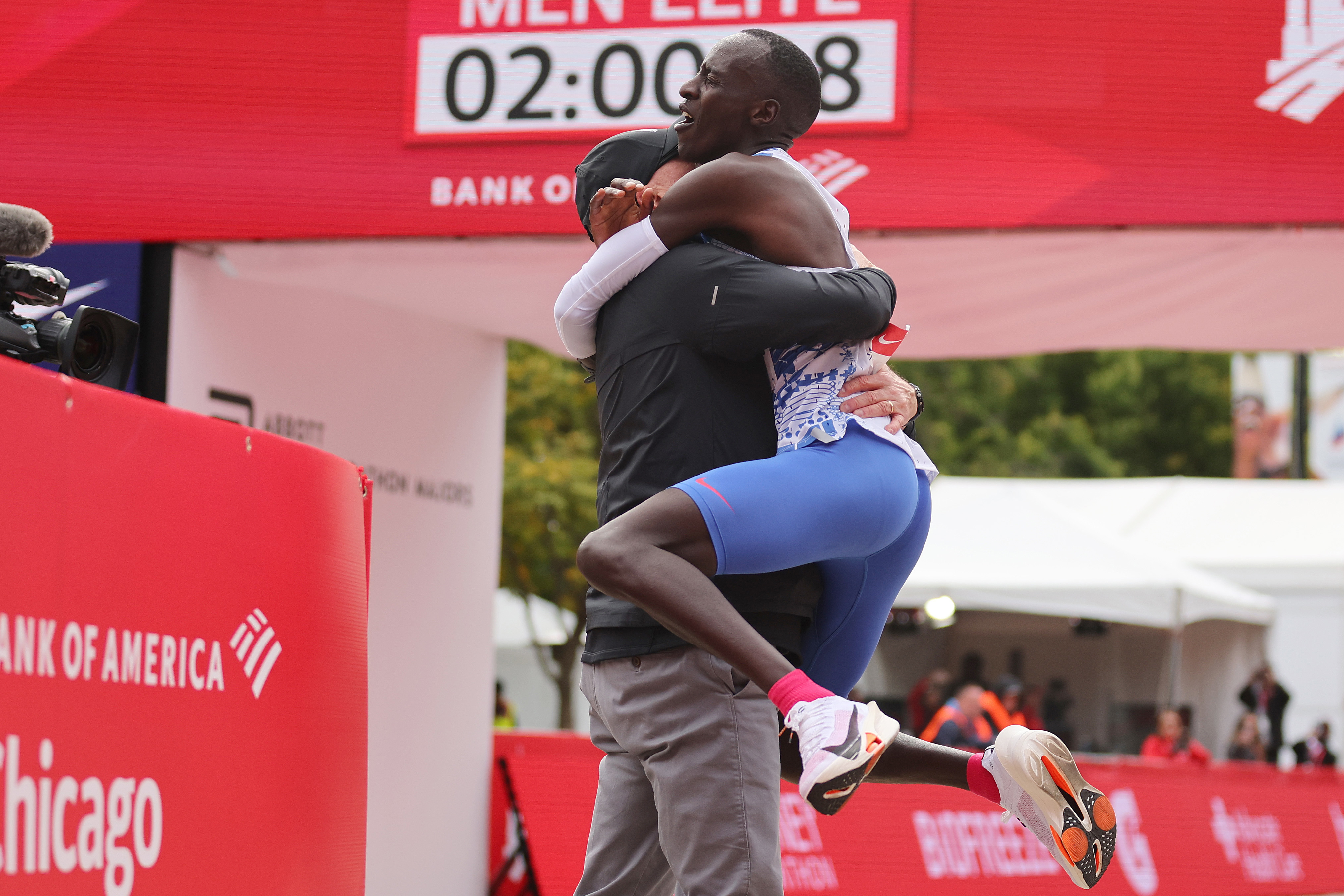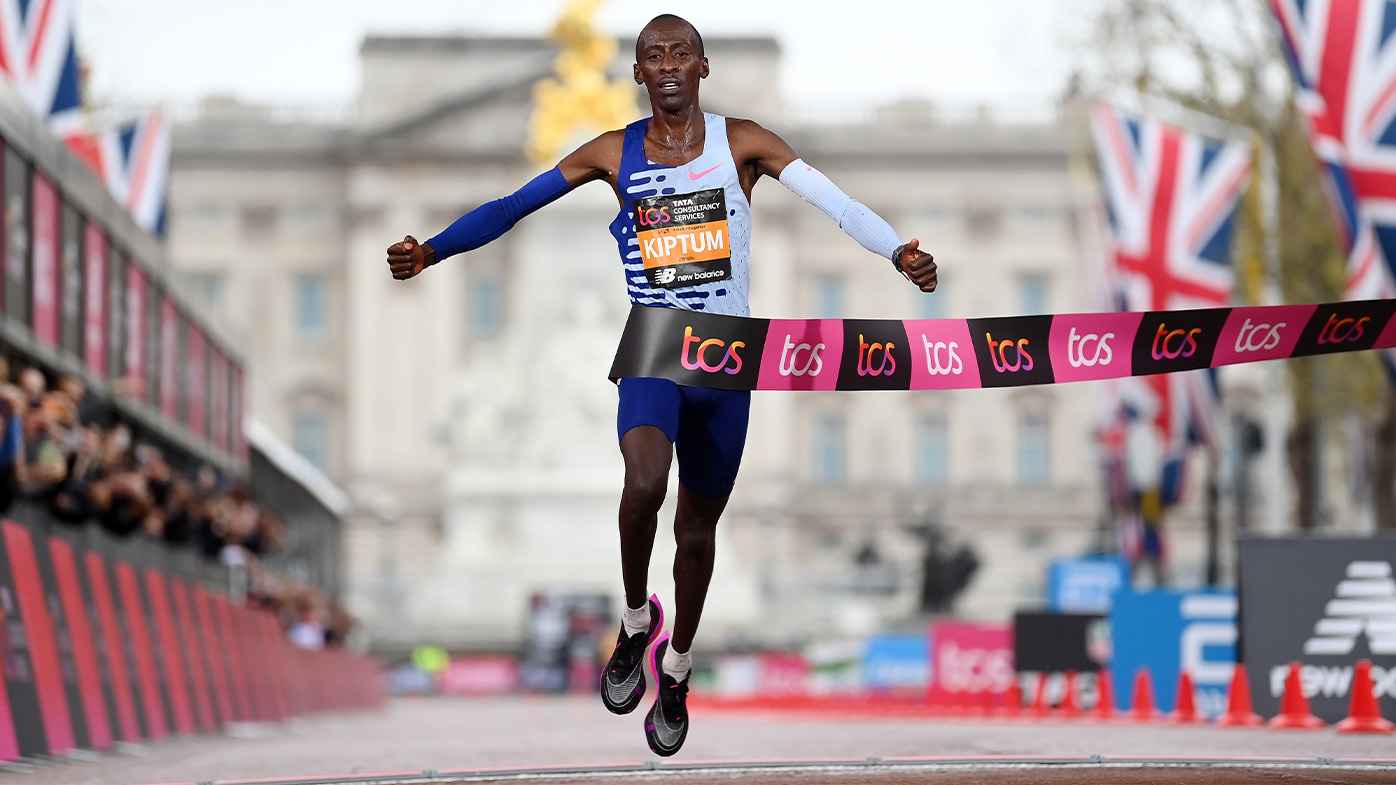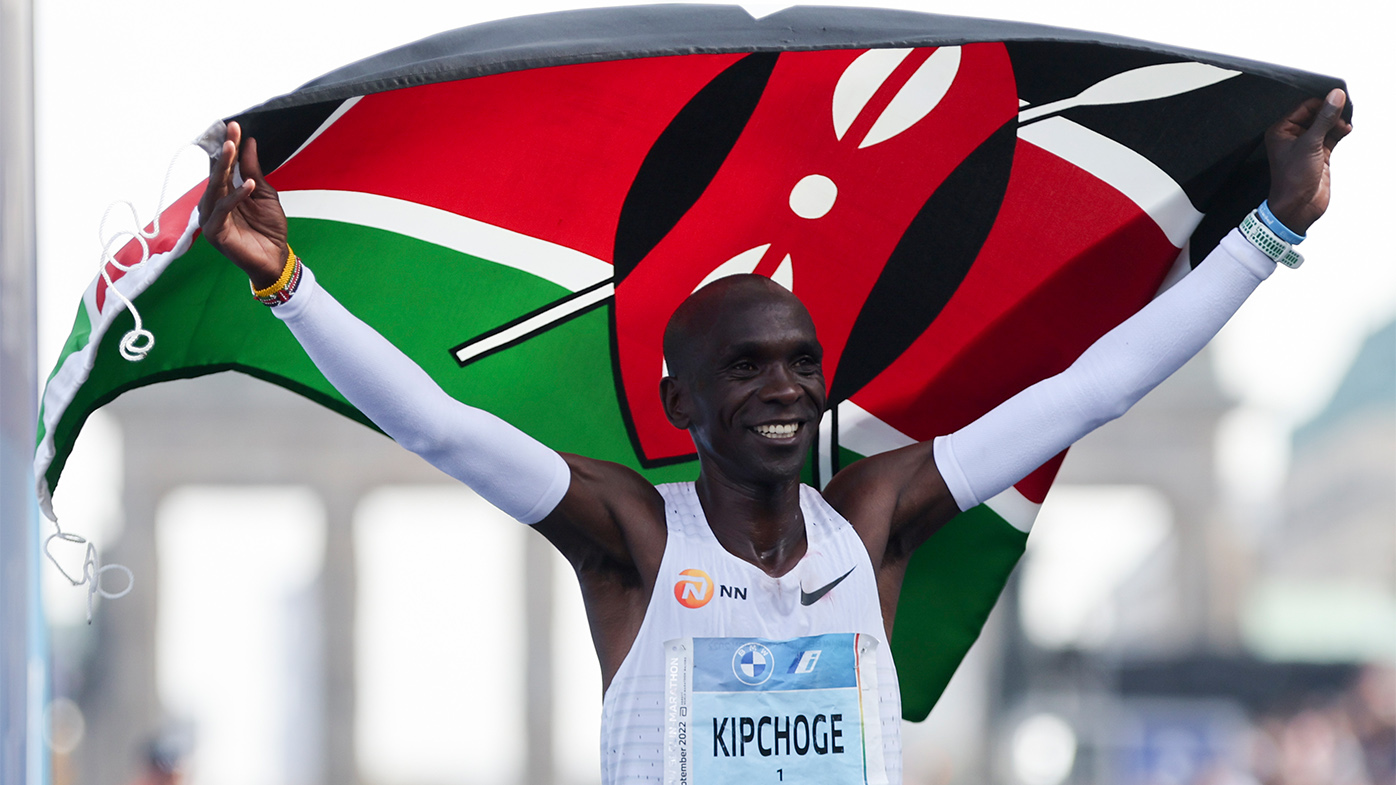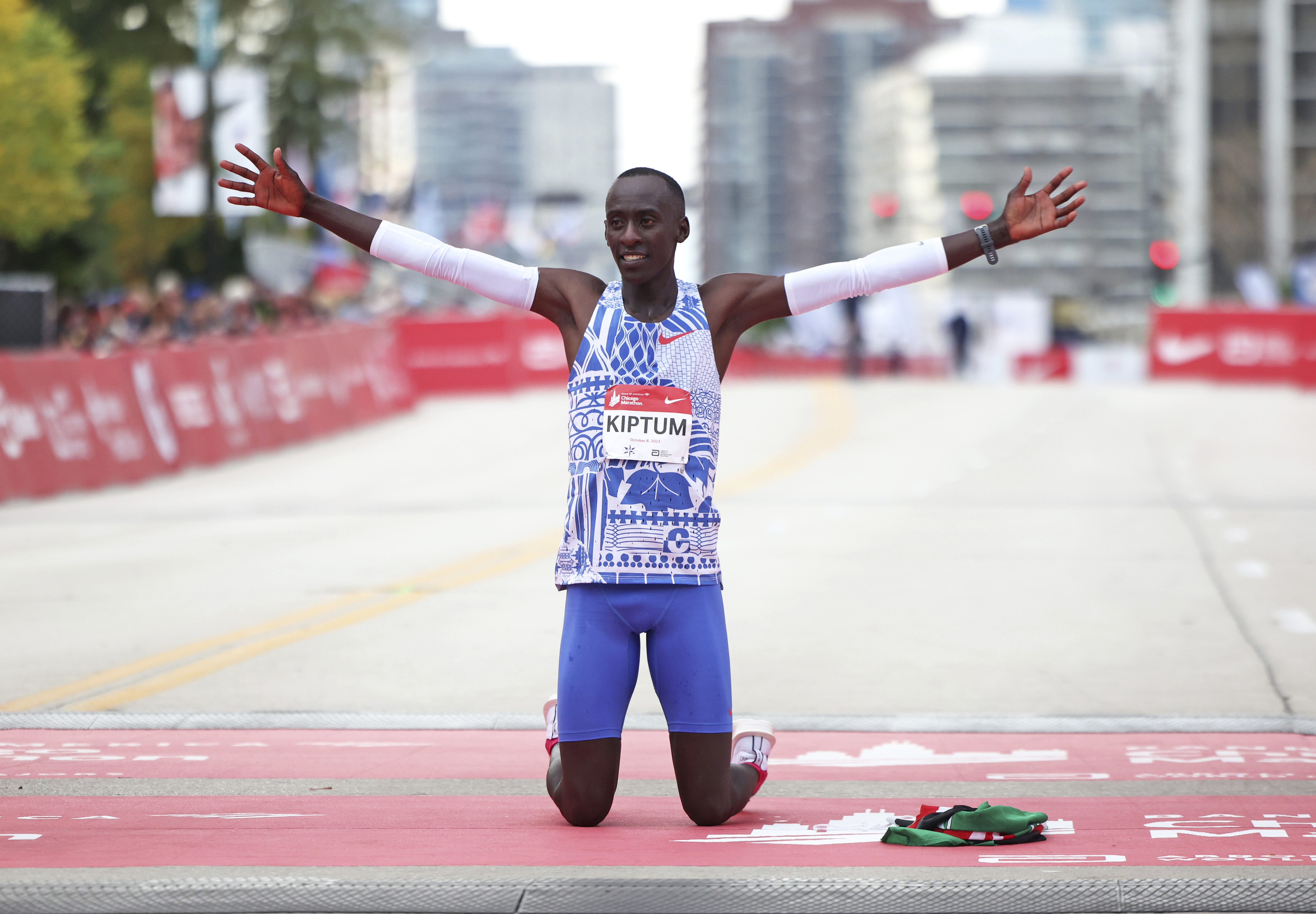Among the many uncomfortable thoughts the athletics world is wrestling with following the tragic death of Kelvin Kiptum, Kenya’s men’s marathon world record holder, there are some jarring questions.
What exactly has been snatched away? Just how mind-bending a career was the 24-year-old superstar carving out?
Kiptum, who died in a car crash in Kenya on Monday (AEDT), shattered Kenyan royalty Eliud Kipchoge‘s world record in last year’s Chicago Marathon, blasting through the race in two hours and 35 seconds (2:00:35). He slashed 34 seconds off Kipchoge’s mark and, all of a sudden, was the raring-hot tip to become the first man ever to run an official sub-two-hour marathon.
READ MORE: Marathon world record holder dead at 24
READ MORE: Kiptum’s record-shattering Chicago Marathon feat
READ MORE: When Kipchoge smashed his own world record in Berlin
His heroics on the streets of Chicago last October formed part of a series of staggering results. He had blazed through the 2022 Valencia Marathon in 2:01:53 to record the fastest debut time in history. And in the second of the three marathons he raced, he clocked 2:01:25 in last year’s London Marathon to obliterate Kipchoge’s course record.
Three of the six fastest marathons ever recorded belong to Kiptum. The nine fastest times are shared by three men: Kiptum, Kipchoge and Ethiopian legend Kenenisa Bekele. Talk about elite company.
The running world had been waiting feverishly for the Paris Olympics showdown between Kiptum and Kipchoge. Would Kipchoge become the first man to win three Olympic marathon gold medals, or would the prodigious talent from the same east African country prove unbeatable in France?
The running world had been infatuated with the prospect of just how fast Kiptum could go in his career, as well as the haul of Olympic gold medals he may have been set to capture.
“Just the way he started marathon running and how dominant he’s been in such a short time, I think it was looking well and truly like he was going to be fairly untouchable,” Liam Adams, a two-time Australian marathon runner, told Wide World of Sports.
“Kelvin was definitely on a progression to be an unstoppable marathon runner.”
Australia’s Jessica Stenson, the gold medallist in the women’s marathon at the 2022 Birmingham Commonwealth Games, is among the many mulling over the “what if?”.
“He was just one of those athletes where you thought, ‘Who knows what’s possible here?’,” Stenson told Wide World of Sports.
“We’ve heard his post-race interviews where he’s said, ‘I didn’t really hurt’, and you think, ‘Far out’.
“He would have been a real legacy athlete. I feel like he would have done some things in his career, because he was a boundary-pusher, that would have challenged the norms, and some people would have followed that and it would have led to breakthroughs for others. We won’t get to see that as much as we could have.
“Although he’s already left a legacy that will be powerful, I think there was a lot more to come … [I think his legacy is] pushing boundaries. He didn’t seem to be so worried about what others thought. He was blazing his own trail in training and in his race approach. So I think it’s that fearless energy that he brought to the sport. There’ll be people thinking of him when they’re out there and feeling inspired to be courageous like Kiptum.”
The fearlessness Stenson is in awe of was on show as Kiptum cranked up the heat late in last year’s Chicago Marathon. His five-kilometre splits ranged between 13:51 and 14:30. The quickest split? The one between 30 and 35 kilometres.
Kiptum’s coach, Rwanda’s Gervais Hakizimana, who also died in the car accident, spilled on his student’s insane training program in an interview with Agence France-Presse. In preparation for last year’s London Marathon, he had regularly chalked up weeks between 250 and 280 kilometres, and had even punched out three weeks in excess of 300 kilometres. And a typical week ahead of the London race had included four “hard” runs.
To put Kiptum’s training regime into context, the majority of the world’s top marathon runners complete between 180 and 230 kilometres a week, including two or three “hard” runs.
“I think I read he was doing around 290-kilometre weeks and some really fast long runs and some short, sharp stuff,” said Adams, who regularly hits 250-kilometre weeks when building for a marathon.
“I don’t think it was for the faint-hearted. He was doing an absolutely crazy training block and training method, which not many people in the world would have been able to do.”
In Valencia in 2019, Kipchoge became the first man to run a sub-two-hour marathon, but it didn’t count as a world record because of a raft of factors, including a rotating cast of pacemakers and laser lights projecting from a car in front.
Adams said it was Kiptum who made him realise an official sub-two-hour marathon could be achieved.
“I actually thought it was impossible to break two hours for the marathon officially, but watching him run, it looked like he was going to be the first one to officially break that sub two hours,” Adams said.
“Will we ever see another athlete do it? I’m not quite sure.
“But it was looking like he was the one to do it. He would have been well and truly into his preparation for the Rotterdam Marathon [to be held in April], where he was going to go for that sub-two-hour marathon … I thought probably in Rotterdam he would do it, and then who knows how much further he could have gone under it?
“He was an absolute freak of an athlete and someone who a lot of runners would have looked up to … He was a once-in-a-lifetime type of athlete and we may not see another athlete like this ever again.”
Stenson admitted the Paris 2024 men’s marathon would feel strange.
“The Paris Olympics I don’t think will be quite the same in the men’s marathon,” said the two-time Olympic marathon runner.
“There may even be some tributes around that time.”
Adams said the Paris 2024 head-to-head had shaped as a changing-of-the-guard moment.
“That was something which was looking to be an incredible rivalry and possibly a moment for the baton to be handed over to the other one,” Adams said.
“Kipchoge coming towards the end of his career, an absolutely incredible athlete, passing the baton over to Kiptum, and then Kiptum taking it to a whole new level. I think we would have been in for an exciting marathon at the Olympics and unfortunately we won’t be able to see that.”
Stenson said she initially struggled to believe the tragic news.
”It’s hard to wrap your head around when you first see it,” she said.
“I didn’t think it was real and then suddenly it hits you — it is.”

